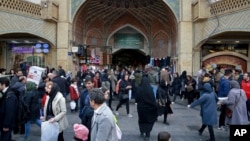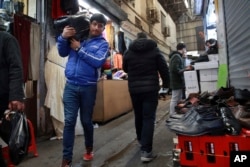This article originated in VOA’s Persian Service.
WASHINGTON —The World Bank says Iran is likely to experience an even worse recession this year than previously thought, as U.S. sanctions largely choke off oil exports that have been Tehran’s main revenue source.
In its latest Global Economic Prospects report published Wednesday, the Washington-based institution that provides loans to countries said it expects Iran’s Gross Domestic Product to shrink by 4.5% this year, a steeper contraction than its earlier estimate of negative 3.6% GDP growth for 2019.
“The oil industry is an important part of Iran’s economy, and its oil production is clearly going to drop because of the new U.S. sanctions,” said Patrick Clawson, research director for the Washington Institute for Near East Policy, in a VOA Persian interview on Wednesday.
The Trump administration imposed a total, unilateral ban on Iranian oil exports on May 2 as part of its campaign of “maximum pressure” on Iran to negotiate an end to its perceived malign behaviors. It had issued sanctions waivers to eight of Iran’s oil customers in November to allow them to keep importing Iranian crude for six months, but later said it would not renew those waivers and would require those customers to reduce such imports to zero.
U.S. economist Steve Hanke of Johns Hopkins University in Baltimore told VOA Persian in another Wednesday interview that Iran’s internal economic problems also are to blame for its worsening recession. “Iran is very corrupt, has very little economic freedom, and it’s hard to start a business there because Iran is not really a free market or liberal economy,” Hanke said.
Transparency International, a Berlin-based civil society organization that monitors global corruption, has ranked Iran 138 out of 180 countries in its Corruption Perceptions Index.
Iran’s other low global economic rankings include 155 out of 180 nations in the Economic Freedom Index of the Washington-based Heritage Foundation, a conservative public policy institute, and 128 out of 190 governments in the World Bank’s Ease of Doing Business index.
The World Bank’s new report also said Iran’s year-on-year inflation rate has risen sharply from about 10% in the middle of last year to about 52% in April. It said the depreciation of Iran’s rial since May 2018, when the U.S. announced it would re-impose sanctions on Iran, has contributed to the rising inflation. The rial’s slump versus the dollar in Iran’s unofficial currency market has made dollar-denominated imports more expensive for Iranians.
Clawson said Iran's inflation is high primarily because it is relying on printing money to finance its spending. “The Iranian government is not bringing in enough revenue to pay for its expenses, so it is borrowing money from the banking system to cover the difference, and that is driving inflation,” he said.
Hanke, who says he is the only economist outside Iran to measure its inflation with high frequency, told VOA Persian that he calculated Iran’s actual inflation rate to be 113% on Wednesday, much higher than the World Bank’s latest reading.
The World Bank’s projection of a 4.5% contraction in Iran’s GDP this year is not as bad as the 6% contraction predicted by the International Monetary Fund, another global lending agency, in its latest report from April. The World Bank also said it expects economic growth in Iran to return next year “as the impact of U.S. sanctions tapers off and as inflation stabilizes.” It projected a 0.9% rise in Iran’s GDP for 2020.
Hanke declined to make his own predictions for Iran’s economic performance, saying any forecasts for a nation such as Iran are problematic because they rely on guesswork.





